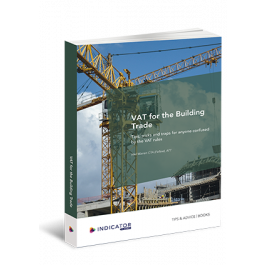VAT for the Building Trade
Tips, tricks and traps for anyone confused by the VAT rules
A Tips & Advice Special Report about...
In a nutshell
Packed with practical examples, this Special Report focuses on two key aims: ensuring that builders don't overpay VAT and getting their VAT returns right for both input tax and output tax, therefore keeping on the right side of HMRC.
In detail
Use this report to:
- Understand the complex rules for the reverse charge for builders
- Know when to charge 0% or 5%
- Consider the potential advantages of the various VAT schemes
- Understand the industry-specific record keeping requirements
- Correctly account for VAT on overseas work
- Explore business splitting for builders close to the VAT threshold
Written by leading VAT experts, this Special Report considers practical situations that commonly occur in the building trade, offering invaluable tips and highlighting the traps to avoid.
We've created this Tips & Advice Special Report especially for...
Everyone involved in the building trade that wants to:
- Get their VAT returns right
- Make sure they don’t overpay both input and output tax
Advisors that want to:
- Be fully informed about the various quirks and opportunities within the legislation that can affect their builder clients
You'll get the following free extras with this Tips & Advice Special Report...
An online service with ready-to-use documents
- To immediately apply our advice and solutions in practice
- That you can easily adapt to suit your own requirements
In this Tips & Advice Special Report you'll read about...
1. Zero-rated work on new dwellings
1.1. Which jobs are zero-rated on dwellings?
1.2. Does zero-rating only apply if a dwelling is built on bare land?
1.3. What is a “new dwelling” for these purposes?
1.4. What about work done by subcontractors?
1.5. Is all work on new dwellings zero-rated?
1.6. What about garages?
1.7. What about design and build services?
1.8. Are building materials supplied with labour always zero-rated?
2. Zero-rated work on other new buildings - charitable and relevant residential usage
2.1. What other buildings can have zero-rated work undertaken on them?
2.2. Do services provided by subcontractors qualify for zero-rating?
2.3. What words must be included on the certificates and when should they be issued?
2.4. What if a customer issues a late certificate after the work has started?
2.5. What is a village hall?
3. Reduced-rate work
3.1. When is 5% VAT charged on building work?
3.2. Must building owners always issue a certificate to support the 5% rate?
3.3. Is all related building work subject to 5% VAT?
3.4. What happens if a dwelling has been partly lived in during the last two years?
3.5. Are there examples of projects when 5% VAT will apply?
3.6. Are there different VAT rules for conversions done for housing associations?
3.7. What checks will HMRC officers carry out when reviewing 5% jobs?
3.8. First-tier Tribunal case study
4. Accounting for VAT - tax points, invoices and bad debts
4.1. What are the tax point rules for building work?
4.2. What about ongoing building work with no finish date?
4.3. If I include a work in progress figure in a builder’s year end accounts, is output tax due on this amount?
4.4. What about retention payments?
4.5. What happens if some of my client’s work is subject to a self-billing arrangement?
4.6. Does self-billing apply to all jobs where there is an agreement with the customer?
4.7. What is an authenticated receipt?
4.8. When can bad debt relief be claimed by a builder on unpaid sales invoices?
5. Other issues - voluntary registration, input tax
5.1. When is voluntary VAT registration worthwhile?
5.2. What about pre-registration input tax for a backdated registration?
5.3. Will HMRC always review a repayment VAT return for the backdated period?
5.4. What issues are important for input tax records?
5.5. If my client buys a new van, should input tax be adjusted for private use?
5.6. What about the purchase of a car?
5.7. Can input tax be claimed on hotel expenses for subcontractors?
6. Useful VAT schemes for builders
6.1. When should I consider recommending special schemes to clients?
6.2. What are the main rules with the FRS?
6.3. Should I focus on the scheme’s tax savings or time savings for my clients?
6.4. What are the relevant FRS rates for builders?
6.5. Presumably it’s best to avoid the scheme if my client uses a lot of VAT-registered subcontractors?
6.6. When must my client leave the scheme?
6.7. Should my clients always use always use the cash accounting scheme if they are eligible?
6.8. What are the other advantages of the CAS?
6.9. When must my clients leave the scheme?
6.10. Can my client use the cash accounting and flat rate schemes at the same time?
6.11. What are the benefits of the annual accounting scheme for builders?
6.12. What are the potential advantages of the AAS?
6.13. When must a client leave the scheme?
7. Reverse charge rules for builders
7.1. What is the purpose of the rules?
7.2. How does the reverse charge work?
7.3. When will the reverse charge be applied?
7.4. What boxes are completed on VAT returns?
7.5. What procedures should my clients consider if they are selling construction services?
7.6. What happens if my client uses the flat rate scheme?
7.7. What if my clients use subcontractors and buy services subject to the reverse charge?
8. Place of supply rules; business splitting; builders buying their own land to build a new dwelling
8.1. What is the VAT situation if my client does work for an overseas property owner?
8.2. What happens if my client does work in EU countries?
8.3. What about work in non-EU countries?
8.4. What happens if my builder clients use overseas builders for UK jobs, perhaps bricklayers from other EU countries?
8.5. One of my builders is getting close to the registration threshold and has asked if he can split his business into two entities. Is this possible?
8.6. How do VAT tribunals deal with appeals when HMRC has denied a business split?
8.7. Some of my builder clients have purchased land in the past to build their own house. What are the VAT issues here?
8.8. Can VAT be claimed if the new house is built with a business motive?
8.9. What if my client changes their mind about renting or selling?
8.10. What if a client intends to rent it out temporarily and sell in a couple of years’ time?
9. Appendices
9.1. Appendix A - New dwellings - retention of façades
9.2. Appendix B - When is a construction complete?
9.3. Appendix C - What items are classed as building materials if they are supplied by a builder in a new dwelling?
9.4. Appendix D - Buildings that qualify as being used for a relevant residential purpose
9.5. Appendix E - Specimen VAT certificate that can be issued to builders by users of new RCP and RRP buildings to support zero-rating on construction services
9.6. Appendix F - VAT certificates - protection for builders from HMRC
9.7. Appendix G - Definition of a multiple occupancy dwelling
9.8. Appendix H - Draft self-billing agreement
9.9. Appendix I - Claiming input tax on vehicles other than cars
9.10. Appendix J - Remaining in the flat rate scheme if turnover threshold was exceeded on a temporary basis
You can choose from the following options...
Paper
- The hard copy version
- Keep it on your desk or use it whenever you're offline
Digital
- The PDF-version
- Delivered to your inbox
Take a look at your options below.
Special subscribers' offer
£90.00
£70.00
Only if you already have a subscriptionStandard offer
£90.00
Special subscribers' offer
£90.00
£70.00
Only if you already have a subscriptionStandard offer
£90.00

Got a question? Call Customer Services
(01233) 653500


 (01233) 653500
(01233) 653500 







